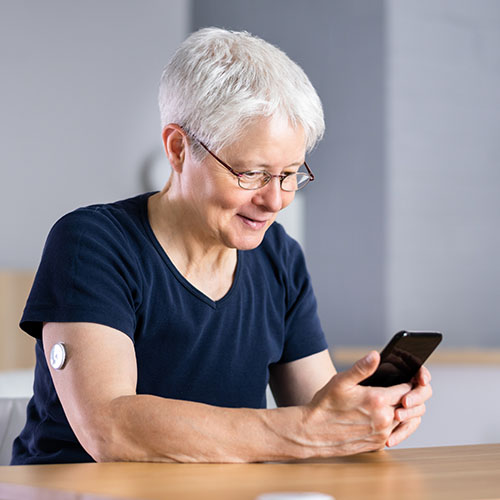We’re Celebrating 1 Year serving our community! See below.
We’re Celebrating 1 Year serving our community! See below.
We’re Celebrating 1 Year serving our community! See below.
We understand a diagnosis of diabetes in any form can be overwhelming. The Central Peninsula Diabetes Center team can assist you in developing a personalized diabetes care plan and is here to encourage you on your health journey. Our clinic offers comprehensive diabetes care, individual and group education, and support throughout the lifespan for people living with diabetes.

Diabetes is, to say the least, a piece of work. But that’s precisely why the anniversary of your diabetes (your diaversary) is something to be proud of. You’re amazing for dealing with that piece of work every single day of the year!
After being diagnosed with diabetes, a diaversary is the celebration of life that came after the diagnosis. For better or for worse, diabetes will have changed your life; you and your perseverance deserve to be recognized!
Often, friends and family can become involved in the work that comes along with diabetes. Use the diaversary to tell your loved ones that you appreciate the help they’ve given during the tough times.
For a diaversary card, it should be up to you what you want to say to your diabetes after a year. Take this opportunity to get insight into your emotions, and maybe even say “Take that!” to diabetes.
When celebrating anything, a meal out at a restaurant is always a pleasure. Choose a restaurant that serves your favorite food, put on your finery, and make the evening special!
A diaversary can bring a great deal of emotions with it – some of them not positive. You might feel resentment or anger regarding your diabetes diagnosis. Take this diaversary to reflect on your past year, and sort through your emotions. It’s ok to not feel ok about your diabetes – if this is you, consider reaching out to your provider or a counselor for support.
Life with diabetes wouldn’t be where it is today without the efforts of the charities that provide for research, advocacy and information about diabetes. Donating to a charity, organizing a fundraising event, or completing a walking, running or biking event.
If you bake it yourself, you’ll know exactly how many carbs are in it. Want help with that? Try happyforks.com, which is a recipe analyzer and useful online tool. Other great recipe ideas can be found on the diabetesfoodhub.org website.
When your diaversary does come along, it’s important to remember that it’s your day. You were the one who has spent a year navigating this condition. Consider boldly sharing on social media the strides you’ve made and what you have been able to accomplish amidst this challenging diagnosis. Who knows, you may be a great encouragement to others!
Adapted from https://www.hedia.com/10-ways-to-celebrate-your-diaversary/
Managing and treating all forms of diabetes by working with primary care providers and endocrinologists through a collaborative and team-based approach. Referrals can be faxed to 1-907-416-7682, but are not required.

• Schedule personalized education on diabetes-related topics of interest to you. Referrals are required for individual diabetes education appointments, but we are glad to help you with the referral process. Have a referral (insert hyperlink to current referral form) faxed by your medical provider to 1-907-714-7682 to get started. You are encouraged to verify coverage with your insurance prior to your first appointment. See the Insurance Coverage Checklist (hyperlink to form) for further information.
• Group sessions are also available as a service to our community and do not require a referral at this time. Feel free to join in on a group session as these are posted to our events calendar (hyperlink).
1 out of every 3 American adults has prediabetes. Before people have Type 2 diabetes they have prediabetes, but 80% do not know it. With prediabetes, knowledge is power, and being able to make moderate lifestyle changes now to reduce the risk for developing type 2 diabetes is possible.
An autoimmune condition in which the pancreas does not produce insulin. Type 1 can occur at any age. This diagnosis requires frequent monitoring of blood sugar levels and insulin administration. About 5-10% of people living with diabetes have Type 1.
A condition in which a person’s body is not able to use insulin produced by the pancreas in an efficient way. A variety of factors contribute to the diagnosis of Type 2, including genetics, environment, life stressors, nutrition, activity, and more. Type 2 can be managed through lifestyle changes, medications, and regular visits with a healthcare provider for prevention of complications.
The hormones of pregnancy sometimes block the action of insulin produced by the pancreas. Without enough insulin, glucose cannot be utilized for energy and this can harm both mother and baby. It is important to quickly learn to manage this condition of pregnancy, and we are here to help.
There are other rare types of diabetes. If you have been diagnosed with type 2 diabetes, but are not responding well to typical treatments, additional evaluation may be indicated. At CPDC we care for all types of diabetes and are glad to assist through consultation and collaboration for the best treatment outcomes.
1 out of every 3 American adults has prediabetes. Before people have Type 2 diabetes they have prediabetes, but 80% do not know it. With prediabetes, knowledge is power, and being able to make moderate lifestyle changes now to reduce the risk for developing type 2 diabetes is possible.
An autoimmune condition in which the pancreas does not produce insulin. Type 1 can occur at any age. This diagnosis requires frequent monitoring of blood sugar levels and insulin administration. About 5-10% of people living with diabetes have Type 1.
A condition in which a person’s body is not able to use insulin produced by the pancreas in an efficient way. A variety of factors contribute to the diagnosis of Type 2, including genetics, environment, life stressors, nutrition, activity, and more. Type 2 can be managed through lifestyle changes, medications, and regular visits with a healthcare provider for prevention of complications.
The hormones of pregnancy sometimes block the action of insulin produced by the pancreas. Without enough insulin, glucose cannot be utilized for energy and this can harm both mother and baby. It is important to quickly learn to manage this condition of pregnancy, and we are here to help.
There are other rare types of diabetes. If you have been diagnosed with type 2 diabetes, but are not responding well to typical treatments, additional evaluation may be indicated. At CPDC we care for all types of diabetes and are glad to assist through consultation and collaboration for the best treatment outcomes.
1 out of every 3 American adults has prediabetes. Before people have Type 2 diabetes they have prediabetes, but 80% do not know it. With prediabetes, knowledge is power, and being able to make moderate lifestyle changes now to reduce the risk for developing type 2 diabetes is possible.
An autoimmune condition in which the pancreas does not produce insulin. Type 1 can occur at any age. This diagnosis requires frequent monitoring of blood sugar levels and insulin administration. About 5-10% of people living with diabetes have Type 1.
A condition in which a person’s body is not able to use insulin produced by the pancreas in an efficient way. A variety of factors contribute to the diagnosis of Type 2, including genetics, environment, life stressors, nutrition, activity, and more. Type 2 can be managed through lifestyle changes, medications, and regular visits with a healthcare provider for prevention of complications.
The hormones of pregnancy sometimes block the action of insulin produced by the pancreas. Without enough insulin, glucose cannot be utilized for energy and this can harm both mother and baby. It is important to quickly learn to manage this condition of pregnancy, and we are here to help.
There are other rare types of diabetes. If you have been diagnosed with type 2 diabetes, but are not responding well to typical treatments, additional evaluation may be indicated. At CPDC we care for all types of diabetes and are glad to assist through consultation and collaboration for the best treatment outcomes.

• Current medication list, or bring all prescription bottles/containers with you if this is easiest.
• All diabetes-related devices; glucometer (blood sugar tester), continuous glucose monitoring (CGM) reader, cell phone, blood sugar log (if you have any of these)
• Insurance card and current ID
• Support Person, as desired
Let’s get you back to doing what you love!
Let’s get you back to doing what you love!